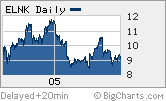 |
| Out of orbit: Shares of EarthLink have done little during the past 12 months. |
|
|
|
|
|
|
|
|
|
NEW YORK (CNN/Money) � Remember when investors loved Internet service providers?
Not that long ago, companies that enabled people to get on the entrance ramp to the information superhighway (how quaint that phrase seems now) were Wall Street superstars. And EarthLink (Research) was one of the leaders.
But as the Internet evolved, the ISP business got a lot less glamorous.
Narrowband Internet access, using a dial-up phone connection to get on the Web, became a commodity. And competition for subscribers heated up further as cable companies and telephone carriers began offering faster broadband connections.
This made life a lot more difficult for companies such as America Online, which, like CNN/Money, is a subsidiary of Time Warner (Research), and United Online (Research), which owns NetZero and Juno.
So it should come as no surprise that EarthLink's core subscriber base has eroded, from 4.4 million narrowband subscribers in the middle of 2001, to 3.8 million recently.
As a result, shares of EarthLink trade nearly 85 percent below their tech bubble high in 1999. What's more, the stock has barely budged during the past year even though the Nasdaq is up nearly 20 percent.
Betting on broadband and wireless
But is the stock now attractive for bargain hunters?
EarthLink reported Tuesday that net income in the recent quarter was down 12 percent from a year ago (although this decline was not as bad as expected). Sales fell 6.6 percent.
Still, the company has some things going for it that could make it an attractive investment...or even a takeover target. For one, the company has successfully cracked the broadband market.
EarthLink had 1.5 million high-speed subscribers at the end of the second quarter, an increase of 24 percent from a year ago. That helped offset the losses in the narrowband business. EarthLink's total subscriber count was up about 1 percent from the same period last year.
However, EarthLink could soon face a roadblock in broadband because of a recent ruling by the U.S. Supreme Court. In what is known as the Brand X case, the decision overturned an earlier appeals court ruling that required cable companies and phone companies to share their high-speed lines with rivals.
ISPs like EarthLink that don't own their own connections to homes and businesses depend on the networks of cable and phone firms to offer broadband service. So EarthLink may soon be faced with much higher costs to gain access to the so-called "last mile." There's also the possibility that it could be frozen out altogether by telecoms and cable companies.
This is obviously troublesome but it probably won't lead to the demise of EarthLink. In a report Tuesday, CIBC World Markets analyst Timothy Horan pointed out that despite many challenges, EarthLink has continued to execute thanks to cost cutting and upgrades to its service quality, which have kept many consumers from fleeing to other services.
EarthLink is also hoping to transform itself into more of a telecom company. It is rolling out an Internet phone service (voice over Internet protocol or VoIP) later this year in conjunction with Covad Communications (Research).
And earlier this year EarthLink announced a joint venture with South Korea's SK Telecom (Research) to offer wireless voice and data services in the United States.
Buyout on the horizon?
Clearly, EarthLink is a company in transition, which makes the stock a bit of a risk.
But all this might already be priced into the shares. EarthLink is profitable and now trades at just 10 times 2005 earnings estimates, well below the average earnings multiple for the broader market.
Investors shouldn't expect a quick turnaround though. Horan wrote in his report that the biggest near-term concern is that broadband price cuts from cable and phone companies will put continued pressure on Internet access pricing, and could speed the decline in EarthLink's dial-up business.
And Youssef Squali, an analyst with Jefferies, thinks the stock may struggle for a while, as long as narrowband subscribers continue to defect and until there is a payoff from the VoIP and SK Telecom rollouts.
"If EarthLink is successful with one or more of these initiatives, you will see momentum return in the stock. But that probably won't be until next year," Squali said.
Still, EarthLink has a squeaky-clean balance sheet, which could make the company an appealing takeover target, especially for a private equity firm, which typically use debt to finance the buyouts of companies. EarthLink has about $430 million in cash and no debt.
Private equity investors, or leveraged buyout (LBO) firms, have shown an increased willingness to go after tech and media firms. Several cable companies are in the process of being taken private. Internet ad agency DoubleClick was recently acquired by a private equity firm as well.
"I don't see a natural strategic buyer for EarthLink but their cash flows are very attractive, which could make it a good LBO opportunity," said Squali.
For a look at more Internet stocks, click here.
For more about personal technology, click here.
Analysts quoted in this story do not own shares of the companies mentioned. CIBC intends to seek investment banking business with EarthLink.
The writer of this story owns shares of Time Warner through his company's 401 (k) plan.
Sign up to receive the Tech Investor column by e-mail.
Plus, see more tech commentary and get the latest tech news.

|